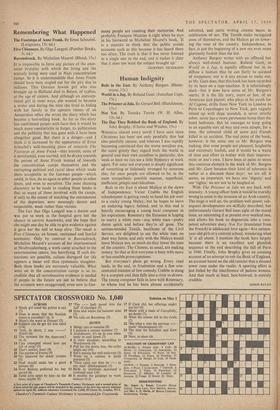Human Indignity
WHEREAS almost every novel I have seen since Christmas has been not only painfully thin but also painfully intense, and whereas I was rapidly becoming convinced that the worse novelists are, the more grimly they regard both the world in general and their own creations in particular, this week at least we can see a little flippancy at work again. For once not everyone is deeply significant of something or hideously wronged by someone else; for once people are allowed to be, in the most sympathetic possible manner, superficial, inefficient, priapic and ridiculous.
Beds in the East is about Malaya at the dawn of Independence. Victor Crabbe the English schoolmaster is getting ready to hand his job over to a cocky young Malay; but he hopes to leave an enduring legacy behind, and to this end is heavily encouraging a young local composer in his aspirations. Rosemary the Eurasian is hoping to marry a white man—any white man—pretty damn quick and before they're all gone. The serious-minded Tamils, backbone of the Civil Service, are delighted to see the white men on their way home, and only wish the Malays would leave Malaya too, so much do they lower the tone of the country. The Chinese, as usual, are making money. So that at first everyone is busy with more or less sensible preoccupations.
But everyone's plans go wrong. Every road leads, in the end, to frustration and a few con- centrated minutes of low comedy. Crabbe is stung by a scorpion and then falls into a river to drown. The young composer falls in love with Rosemary, to whose bed he has been almost accidentally
admitted, and starts writing cinema music in celebration of sex. The Tamils make variegated asses of themselves, and the Malays go on lower- ing the tone of the country. Independence, in fact, is just the beginning of a new era even more gloriously foolish than the last.
Anthony Burgess writes with an offhand but always well-timed humour. Roland Gant, in World in a Jug, is equally offhand but in so diffuse a fashion that he can fairly be accused of sloppiness; nor is it any excuse to make out, as Mr. Gant does, that this book has been recorded by its hero on a tape-machine. It is infuriatingly slack—but it does have some of Mr. Burgess's merits. It is the life story, more or less, of an American jazz pianist, who plays in his youth for Al Capone, drifts from New York to London to Paris to Copenhagen to New York, gets vaguely mixed up with dope scandals, is never strictly sober, never has a more permanent home than the hotel bedroom. But he manages to keep going in an equable sort of way and even adopts, for a time, the coloured child of some jazz friends killed in an accident. The real point of the book, however, is the same one as Mr. Burgess was making, that most people are pleasant, laughable and extremely foolish, and it would be a waste of time and effort to bother with their improve- ment or one's own. I have been at pains to stress this common element in the work of Mr. Burgess and Mr. Gant because their kind of tolerance is rather at a discount these days : we are all, it seems, so important, we have our 'dignity' and our 'rights,' we are not to be laughed at.
With The Prisoner at Jala we are back with intensity. A young officer feels it would be morally wrong to assist in the invasion of an Arab country. The stage is well set, the problem well posed; sub- sequent developments are skilfully described; but unfortunately Gerard Bell loses sight of the moral issue, an interesting if at present over-worked one, and allows his book to degenerate into a com- petent adventure story. Not Yet (translated from the French) is adolescent love again—five sixteen- year-old girls at a convent school, wondering what 'it' is all about. I mention the book here largely because there is an excellent and ghoulish sequence at the end describing the fall of Paris in 1940. Finally, John Brophy gives an amusing account of an attempt to rob the Bank of England, an account based on the old rumour that a disused sewer runs under the vaults. A sporting effort is just foiled by the interference of jealous women. And that much at least, best-beloved, is entirely credible.
SIMON RAVEN


































 Previous page
Previous page